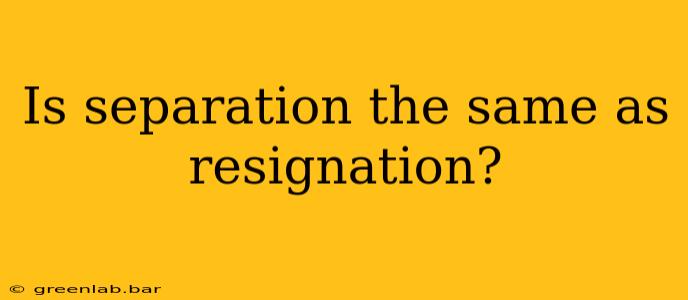Is Separation the Same as Resignation? Understanding Key Differences in Employment
The terms "separation" and "resignation" are often used interchangeably, leading to confusion about their actual meanings in the context of employment. While both signify the end of an employee's tenure with a company, they represent distinct circumstances and have different implications for both the employee and the employer. This article will clarify the key differences between separation and resignation, exploring the nuances of each and highlighting potential legal and practical ramifications.
Resignation: A Voluntary Exit
Resignation refers to the voluntary termination of employment by an employee. This typically involves the employee proactively informing their employer of their intention to leave, often providing a formal letter of resignation specifying a notice period. The employee initiates the separation process, and the reasons behind the decision are usually personal, such as pursuing new opportunities, relocating, or retirement.
Key Characteristics of Resignation:
- Employee-initiated: The employee makes the conscious decision to leave.
- Notice period: A resignation often includes a notice period, allowing the employer time to find a replacement. This period is often stipulated in employment contracts or company policy.
- Generally amicable: While disagreements may exist, resignations are usually less contentious than other forms of separation.
- Positive impact on future employment: A clean resignation can positively affect an employee's future job prospects, as it demonstrates professionalism and initiative.
Separation: A Broader Term Encompassing Various Exit Scenarios
Separation from employment is a broader term that encompasses a wider range of scenarios resulting in the end of an employment relationship. It's an umbrella term that includes resignation, but also covers involuntary terminations.
Types of Separation (Beyond Resignation):
- Termination: This involves the employer ending the employee's employment, often due to performance issues, misconduct, redundancy, or downsizing. This can be with or without cause, significantly impacting severance pay and potential legal recourse for the employee.
- Layoff: A layoff is a form of termination where the employee is dismissed due to economic reasons or restructuring within the company. It's often temporary, but can also be permanent.
- Retirement: While technically a form of resignation, retirement is distinct due to its age-related nature and often comes with specific benefits and provisions.
- Mutual Agreement: In some cases, both the employer and employee agree to end the employment relationship. This often involves a negotiated severance package.
Legal and Practical Differences:
The distinction between separation and resignation holds significant legal and practical implications. For example:
- Unemployment benefits: Employees who are terminated (laid off or fired) are often eligible for unemployment benefits, unlike those who voluntarily resign.
- Severance pay: The amount of severance pay, if any, often differs significantly depending on the reason for separation. Terminations may offer severance packages, while resignations often do not.
- References: Employers may be more hesitant to provide positive references for employees terminated for cause, compared to those who resigned.
In Conclusion: Understanding the Nuances
While "separation" is a broader term encompassing various ways an employment relationship can end, "resignation" specifically refers to a voluntary termination initiated by the employee. Understanding these differences is crucial for both employees and employers to navigate the complexities of employment law and ensure a smooth transition during the separation process. Consulting with a legal professional is always advisable if facing complex separation issues.

